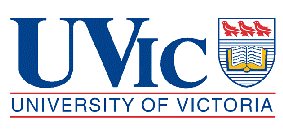

Instructor: |
Office Hours: |
|||||
| |
Dr. Fayez Gebali | Days:
By appointment |
||||
| Phone: 721-8941 | |
Time: 9:30-10:20 |
||||
| Email: fayez at ece dot uvic dot ca | Location: ELW A236 | |||||
Lectures: |
Labs: |
|
||||
| Section(s): K01 | Section (s) | Day(s) | Time |
|||
| Days: M | LS02 |
M |
3:30-6:30PM |
|||
| Time: 10:30 - 11:20 | LS03 |
T |
2:30-5:30PM | |||
| Location: DSB C118 |
|
|||||
| |
|
|
||||
Optional Text: |
Optional Text: |
|||||
| Title: Application-Specific Integrated Circuits | Title: The Student's Guide to VHDL | |||||
| Author:
Michael John Sebastian Smith |
Author: P. J. Ashenden | |||||
| Publisher:
Addison-Wesley
Publishing Company |
Publisher: Morgan Kaufmann Publishers | |||||
| Year: 1997 | Year: 1998 | |||||
| ISBN: 0-201-50022-1 | ISBN: 1-55860-520-7 | |||||
| Class notes and lectures slides |
||||||
| Available from the course web page | ||||||
| Bring each lecture's slides with you to class. | ||||||
References: |
||||||
| N/A |
||||||
Assessment: |
CENG 465 / CENG 441
|
ELEC 543 |
||||
| Assignment: | 10% |
10 % |
||||
| Labs*: | 15% |
N/A |
||||
| Projects |
N/A |
15% |
||||
| Mid-term (date: 14 June): | 25% |
25% |
||||
| Final: | 50% |
50% |
||||
Due Dates for Assignments: |
||||||
| TBD |
||||||
| CENG
465/ELEC 543 (1.5) Digital VLSI Systems
Overview of VLSI technology, VLSI design methodology and design options. System design, simulation, and synthesis using hardware description languages (e.g. VHDL). Ad-hoc and structured design for testability techniques. System design examples from communications and computer arithmetic. CMOS circuit and logic design. Graduate students are required to complete a project. Prerequisites: CENG 290 or CSC 355 or equivalent, and fourth year standing. |
| 90 | <= | A+ | <= | 100 | |
| 85 | <= | A | < | 90 | |
| 80 | <= | A- | < | 85 | |
| 75 | <= | B+ | < | 80 | |
| 70 | <= | B | < | 75 | |
| 65 | <= | B- | < | 70 | |
| 60 | <= | C+ | < | 65 | |
| 55 | <= | C | < | 60 | |
| 50 | <= | D | < | 55 | |
| 35 | <= | E | < | 50 | Fail, conditional supplemental exam* - for undergraduate courses only (e.g., CENG 465). |
| F | < | 35 | Fail, no supplemental exam. | ||
| N | Fail, did not write examination or otherwise complete course requirements by the end of the term or session; no supplemental exam. |
* The
rules for supplemental examinations are found on page 73
of the current 2004/05 Calendar.
| For courses taken in | Application Deadline for Supplemental Exam | Supplemental Exam Date |
| January – April | June 30 | First week of classes in September-December term |
| May – August | October 30 | First week of classes in January-April term |
| September – December | February 28 | First week of classes in May-August term |
You are advised to read the Faculty of Engineering document Standards for Professional Behaviour at http://www.engr.uvic.ca/policy/professional-behaviour.html which contains important information regarding conduct in courses, labs, and in the general use of facilities.
 |
Return back to the course home page. |